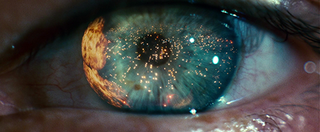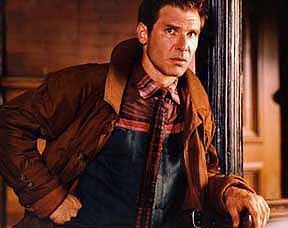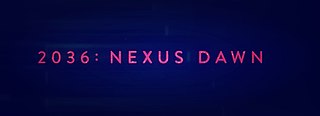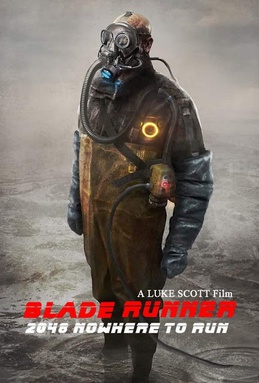
Blade Runner is a 1982 science fiction film directed by Ridley Scott, and written by Hampton Fancher and David Peoples. Starring Harrison Ford, Rutger Hauer, Sean Young, and Edward James Olmos, it is an adaptation of Philip K. Dick's 1968 novel Do Androids Dream of Electric Sheep? The film is set in a dystopian future Los Angeles of 2019, in which synthetic humans known as replicants are bio-engineered by the powerful Tyrell Corporation to work on space colonies. When a fugitive group of advanced replicants led by Roy Batty (Hauer) escapes back to Earth, burnt-out cop Rick Deckard (Ford) reluctantly agrees to hunt them down.
A replicant is a fictional bioengineered humanoid featured in the 1982 film Blade Runner and the 2017 sequel Blade Runner 2049 which is physically indistinguishable from an adult human and often possesses superhuman strength and intelligence. A replicant can be detected by means of the fictional Voight-Kampff test in which emotional responses are provoked; a replicant's nonverbal responses differ from those of a human. Failing the test leads to execution, which is euphemistically referred to as "retiring."
Escape or Escaping may refer to:
John C. "Jay" Cocks Jr. is an American film critic and screenwriter. He is a graduate of Kenyon College. He was a critic for Time, Newsweek, and Rolling Stone, among other magazines, before shifting to screenplay writing. He was married to actress Verna Bloom from 1972 until her death in 2019. They had a son, Sam, born in 1981.

Robert Patrick Mulligan was an American director and producer. He is best known for his sensitive dramas, including To Kill a Mockingbird (1962), Summer of '42 (1971), The Other (1972), Same Time, Next Year (1978), and The Man in the Moon (1991). He was also known in the 1960s for his extensive collaborations with producer Alan J. Pakula.
David Webb Peoples is an American screenwriter who wrote Blade Runner (1982), Unforgiven (1992), and 12 Monkeys (1995). He has been nominated for Oscar, Golden Globe, and BAFTA awards. He won the best screenplay awards from the L.A. Film Critics (1991) and National Society of Film Critics (1992) for Unforgiven.

Hampton Lansden Fancher is an American actor, screenwriter, and filmmaker, who co-wrote the 1982 neo-noir science fiction film Blade Runner and its 2017 sequel Blade Runner 2049, based on the novel Do Androids Dream of Electric Sheep? by Philip K. Dick. His 1999 directorial debut, The Minus Man, won the Special Grand Prize of the Jury at the Montreal World Film Festival.

Despite the initial appearance of an action film, Blade Runner operates on an unusually rich number of dramatic levels. As with much of the cyberpunk genre, it owes a large debt to film noir, containing and exploring such conventions as the femme fatale, a Chandleresque first-person narration in the Theatrical Version, the questionable moral outlook of the hero—extended here to include even the literal humanity of the hero, as well as the usual dark and shadowy cinematography.

"Tears in rain" is a 42-word monologue, consisting of the last words of character Roy Batty in the 1982 Ridley Scott film Blade Runner. Written by David Peoples and altered by Hauer, the monologue is frequently quoted. Critic Mark Rowlands described it as "perhaps the most moving death soliloquy in cinematic history", and it is commonly viewed as the defining moment of Hauer's acting career.

Rick Deckard is a fictional character and the protagonist of Philip K. Dick's 1968 novel Do Androids Dream of Electric Sheep?. Harrison Ford portrayed the character in the 1982 film adaptation, Blade Runner, and reprised his role in the 2017 sequel, Blade Runner 2049. James Purefoy voiced the character in the 2014 BBC Radio 4 adaptation.
Michael Almereyda is an American film director, screenwriter, and film producer.

The Bladerunner is a 1974 science fiction novel by Alan E. Nourse, about underground medical services and smuggling. It was the source for the title, but no major plot elements, of the 1982 film Blade Runner, adapted from the novel Do Androids Dream of Electric Sheep? by Philip K. Dick, though elements of the Nourse novel recur in a pair of 2002 films also largely adapted from Dick's work, Impostor and Minority Report.

Blade Runner 2049 is a 2017 American epic neo-noir science fiction film directed by Denis Villeneuve and written by Hampton Fancher and Michael Green. A sequel to the 1982 film Blade Runner, the film stars Ryan Gosling and Harrison Ford, with Ana de Armas, Sylvia Hoeks, Robin Wright, Mackenzie Davis, Dave Bautista, and Jared Leto in supporting roles. Ford and Edward James Olmos reprise their roles from the original film. Gosling plays K, a Nexus-9 replicant "blade runner" who uncovers a secret that threatens to destabilize society and the course of civilization.
TSG Pictures was a film production company established in 1990 by Bob Gosse, Larry Meistrich, Larry Russo, Whitney Ransick, Christopher Walsh, Eli Kabillio, Daniel Silverman and David Tuttle in association with Hal Hartley, Ted Hope, Nick Gomez and Michael Almereyda. Larry Meistrich was key in raising financing for the newly found film consortium. Its mission was to nurture New York City filmmakers to make director-driven pictures. Meistrich brought into the firm Steve Carlis to share financial oversight responsibilities and bring in new funding sources.
Blade Runner is an American neo-noir science fiction media franchise originating from the 1968 novel Do Androids Dream of Electric Sheep? by Philip K. Dick, about the character of Rick Deckard. The book has been adapted into several media, including films, comics, a stage play, and a radio serial. The first film adaptation was Blade Runner, directed by Ridley Scott in 1982. Although the film initially underperformed at the American box office, it became a cult classic, and has had a significant influence on science fiction. A novelization and a comic adaptation of the film were released in the same year. From 1995 to 2000, three novels serving as sequels to both Blade Runner and the original novel were written by K. W. Jeter, a friend of Dick's. A film sequel to Blade Runner, Blade Runner 2049, was released in 2017. To celebrate the 30th anniversary of Blade Runner in 2012, a short film was released, and in the lead up to the release of Blade Runner 2049, several more short films detailing events that occurred between 2019 and 2049 were released. The influence of the franchise has helped spawn the cyberpunk genre.

2036: Nexus Dawn is a 2017 American short film acting as a prequel to the feature film Blade Runner 2049. It is one of three such prequels, alongside Blade Runner Black Out 2022 and 2048: Nowhere to Run. The short was released on August 30, 2017, approximately five weeks before the release of the feature film, and features Jared Leto as Blade Runner 2049 character Niander Wallace, alongside Benedict Wong. The film was written by Hampton Fancher and Michael Green, who also wrote the feature film, and directed by Luke Scott, whose father Ridley Scott directed the original Blade Runner and is executive producer on the sequel Blade Runner 2049.

2048: Nowhere to Run is a 2017 American neo-noir science fiction short film acting as a prequel to the feature film Blade Runner 2049 and the sequel to the short film 2036: Nexus Dawn. It is one of three such prequels, alongside Blade Runner Black Out 2022 and 2036: Nexus Dawn. The short was released on September 16, 2017, approximately three weeks before the release of the feature film, and features Dave Bautista as Blade Runner 2049 character Sapper Morton, alongside Orion Ben. The film was written by Hampton Fancher and Michael Green, who also wrote the feature film, and directed by Luke Scott, whose father Ridley Scott directed the original Blade Runner and is executive producer on the sequel Blade Runner 2049.
The 16th Washington D.C. Area Film Critics Association Awards were announced on December 8, 2017.

Noah Flynn Kaplan, known professionally as Noah K, is an American composer, saxophonist, and record producer.











